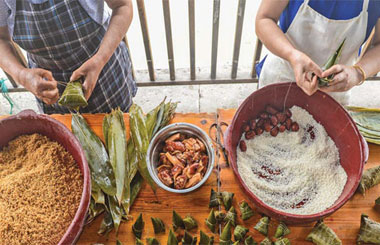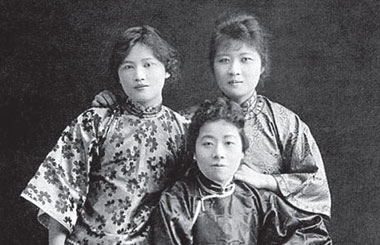Lamian makers use noodle to escape poverty
Updated: 2016-06-07 10:13
(Xinhua)
|
|||||||||
XINING -- Hualong, a remote county in northwest China's Qinghai province, may be little known to outsiders, but its lamian, or hand-pulled noodles, enjoy nationwide fame.
Most people in Hualong, with a total population of 286,000, lived below the poverty line until the beginning of a wave of migrations to other Chinese cities to open lamian restaurants.
Now more than a third of Hualong's registered population are in the lamian business, working in hundreds of cities across China, said Ma Qianli, deputy head of the county government.
These restaurants' annual revenues totalled 6.2 billion yuan (about $950 million) last year, with profits of more than 1.8 billion yuan, he added.
Though flavors may vary according to location, Hualong lamian has common standards: The clear broth should be made from marinading cow bones for more than four hours, noodles should be served with thin slices of white radish, and the dish should use local hot pepper as its seasoning.
Lamian dishes have become a desirable fast food for city folk.
Hard work and honesty in doing business are the keys to success in running a lamian restaurant, said Ma Yong, a 40-year-old man from Hualong. He has made a fortune selling lamian noodles in Shenzhen since the 1990s.
"Poverty forced me to leave home and find a living," Ma said. "When I arrived in Shenzhen, I had nowhere to sleep but on the floor of the shop I rented, or I would sleep in cheap public bathhouses, five yuan a night."
"Now many of my friends own franchise stores selling the noodles in cities like Beijing and Shanghai," said Ma, who returned home in 2014 and opened an animal husbandry company.
Hualong lamian makers have taken their noodles abroad too. Lamian restaurants have been opened in countries including Malaysia, Bangladesh and Turkey.
"Pulling noodles has changed the lives of people in Hualong. It has freed them of the entrapment of the mountains, and helped them move out of poverty," said Ma Qianli.
Today's Top News
Former PM warns of chaos in case of Brexit
Basic income plan rejected by Swiss voters
Eyeing the goal in European football
Suddenly, it's a small world
China looking forward to trade talks with EEU: MOC
Russia to promote EAEU-China economic cooperation
AIIB 'set to earn international trust, credibility'
EIB and AIIB to strengthen cooperation
Hot Topics
Lunar probe , China growth forecasts, Emission rules get tougher, China seen through 'colored lens', International board,
Editor's Picks

|

|

|

|

|

|







